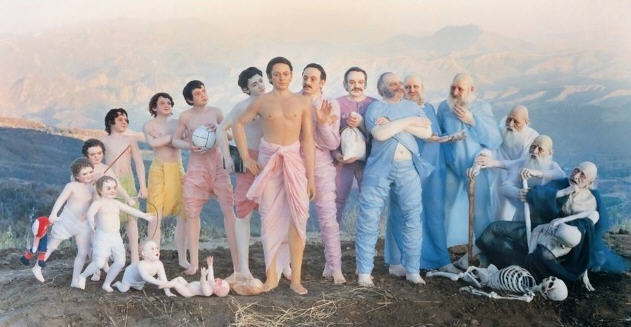
Every seven years, scientists say, all the cells in your body have changed,
including the cells in your brain. Yet something is constant.
If all you see here is bodies changing, you're not seeing the point. The bodies are changing that's obvious. But the most important person in this picture is the person you can't see at all. That person is the living spark of consciousness within the body. In other words, that person is you. Whoever you are, your body is changing. You once had the body of a child. Now you have the body of a young person or old person. The change is gradual, yet continuous. At every moment, within your body, millions of chemical reactions are taking place, millions of cells are growing, dying off, replacing themselves. Just as you can't walk into the same stream twice (at every moment the stream is changing), you can't keep your body the same.
Your mind is changing, too, from moment to moment. And your intelligence is also changing becoming sharper, we hope, and more mature.
So far we've been talking about your body, your mind, your intelligence. Now, what about you?
You are not your body. This is not meant to be an enigmatic koan, nor merely a statement of dogma or belief. Rather, it is a scientific observation, one that bears repeating: you are not your body. Please consider this carefully.
Your body and mind are changing at every moment. Every seven years, scientists say, all the cells in your body have been replaced, including the cells in your brain. Yet something is constant.
That something is the consciousness within the body. If you think about it, you will almost certainly agree that there's a difference between you and your experiences, you and your surroundings, you and your hands, your feet, your chest, your head, even you and your present thoughts (whatever you were thinking an instant ago, that thought has just gone away, and so by now has the one that followed it but you, I trust, are still reading on).
You are still reading on. Not you the body or you the mind, for the body and mind of a few moments ago no longer exist, but you the observer, you the consciousness within.
Although your body and mind change, that consciousness is permanent. Of course, the content of consciousness may change, but the fact of consciousness does not. Within the body of the smallest child, consciousness is present. As the child matures, he gives up the child's body for that of a young man and an old man, just as one might take off old clothes and put on new ones. But just as the person changing the clothes remains the same person, the conscious individual who changes from one body to another remains the same person within, the same conscious observer.
And what about death? When the body falls dead, it no longer holds consciousness. But has that individual consciousness ceased to exist? After all, throughout an entire lifetime of change from one body to the next, that consciousness has persisted. Now it is gone. Where is it?
And where did it come from?
Is it possible that at the time of death that conscious individual continues to exist? If so, where does he go? Might this individual spark of life, this individual consciousness, travel on to another body, to take birth again and go again through the cycle? And if so, does this cycle have an end?
These are some of the questions posed, examined, and answered in the philosophy of Krsna consciousness.
